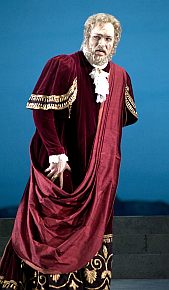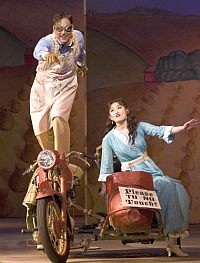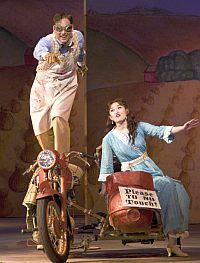There is something highly unusual about Shrader's singing: He opens his mouth, glorious music comes through it, and that's about the size of it. In his voice production, his making music, his projection, diction, and legato (oh my — the legato!) — everything about this artist is natural and effortless, so different from just about everybody else. Add more volume, slip in some powerful high notes, acquire a more recognizable timbre, and you've got a truly great tenor. Oh, and he is still on the better side of 30.
Nemorino as Career-Starter

San Francisco Opera's Idomeneo
Photo by Terrence McCarthy
It opened with three charming Benjamin Britten songs. Ca' the Yowes (without subtitles, alas) was a good opener, but immediately, Shrader hit it out of the ballpark with The Foggy, Foggy Dew. The utterly simple story of a bachelor who rescues a fair maid from the foggy, foggy dew ("She sighed, she cried, she damn' near died, she said, 'What shall I do?!'") only to end up with a son whose eyes remind him of the fair young maid, was so charmingly — apologies for the overuse of the word — simple that the entire auditorium beamed with pleasure.
Shrader's performance of the final Britten song, The Last Rose of Summer, brought to mind a popular description of our new president: Shrader is the no-drama guy. Instead of squeezing tears and blood from the Thomas Moore text ("When true hearts lie wither'd, and fond ones are flown,/Oh! who would inhabit this bleak world alone?"), Shrader sang it clearly and beautifully, allowing the audience to make its own emotional connections.
Dichterliebe
Then came the daring centerpiece of the evening, Schumann's Dichterliebe (The poet's love) — a cycle for mature singers about young passion. Shrader didn't sing it maturely or youthfully; he sang it straight and simple, and just right.Supported by John Parr's exceptional and supportive accompaniment, the tenor opened with "Im wunderschönen Monat Mai" (The wonderful month of May), neither tearing into it nor using the song as a warm-up; he sang it right, with projection, diction, pauses, and everything else in place. There was a bit of a dip in "Aus meinen Tränen" (From my tears), when monotony sneaked in for a minute, but the devilishly difficult "Die Rose, die Lilie ..." couldn't have been better.
The high point of the cycle was "Ich grolle nicht" (No grudge), in which Shrader brought great intensity to the music, while not giving in to theatrical pathos. The last word of "Allnächtlich" (Every night) — the "forget" of forgetting a secret word — disappeared in a way that I don't recall having heard even from the greatest of Schumann interpreters.
The cycle ended with Shrader closing the large, heavy coffin of love and hope, "sank with it my love/And my pain, deep within," with a balance of depth of feeling and restraint that was thrilling.
Voyage Through Ecstasy and Sadness

Ji Young Yang as Adina
Photo by Kristen Loken Anstey
Incidentally, Shrader is one of the singers featured in the Metropolitan Opera's documentary film The Audition, which will be shown as a part of the Met's series of high-definition presentations in theaters nationwide on April 19. And, though this has nothing to do with Shrader, don't miss Every Little Step (also about auditions, this time for A Chorus Line), also coming in April.

